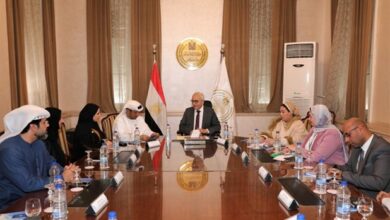
The Egyptian Tax Authority has demanded that the owners of private tutoring centers pay income tax for the center’s activities, despite the illegality of these centers.
The Ministry of Education prepared a draft law criminalizing the establishment of these centers, but officials in the Tax Authority emphasized that the goal is to combat tax evasion and include the informal economy.
Center owners paying their tax has nothing to do with legalizing its status, it stressed.
Private tutoring centers in Egypt to teach students away from the school classroom in return for a fee in order to raise their educational level, in light of the overcrowding of schools in Egypt with students.
The Ministry of Education has tried to launch several campaigns to close these centers for decades, but centers continue popping up across the country.
The authority issued a warning to the owners of private lessons centers to pay income tax, so that they would not fall under the threat of tax evasion in order to achieve tax justice and include the informal economy under the authority’s tax umbrella, said the advisor to the head of the Egyptian Tax Authority, Said Fouad.
He stressed that the Ministry of Education still considers the centers illegal, as the authority is only concerned with collecting tax on any commercial activity.
The Egyptian Tax Authority called on those involved in private tutoring to go to the nearest tax office and open a tax file for this activity in no later than one month.
Speaking to CNN, he explained that the Tax Authority has been dealing with private lesson centers for a long time, by launching campaigns against these centers, to know the number of classes in the center and the number of students in each class to calculate the center’s income and estimate the tax value.
Several major teachers have already opened a tax file, he said.
The Tax Authority obligated the owners of private lesson centers to notify the authority with the basic data of the address of the center of the activity or its branches, the number of halls and the seating capacity of each hall, as well as the names of teachers and their data and the nickname, if any.
It is difficult to estimate the target tax revenue from the activity of private tutoring centers, he said, due to the absence of official data on the size of these centers and the number of those attending them, as well as the number of teachers working in them.
Coordination will be made with the Ministry of Education to prepare a database for these centers.
In 2018, the Ministry of Education prepared a draft law criminalizing private lessons.
The project, which was not approved by Parliament, includes imposing financial penalties of not more than LE50,000 for anyone who gives a private lesson in an educational center or or in a place open to the public.
The penalty was harshened to imprisonment for a period of not less than one year and not more than three years, for those who repeat the crime.
The submission of tax returns by the owners of private tutoring centers has existed since 2005 in accordance with the income tax law, Advisor to the Minister of Finance for International Taxes, Ramy Youssef, said, adding that the Egyptian Tax Authority issued a reminder to the owners of the centers in order to preserve the rights of the state and achieve tax justice.
Youssef added that the Ministry of Finance was working on a plan to expand the base of financiers, to include the e-invoice system and e-commerce.
Egypt achieved tax revenues of LE835 billion during the last fiscal year 2020/2021, a growth of 12.8 percent. The growth was attributed to the efforts made to modernize and mechanize the tax and customs systems, expand the tax base and striving to reduce tax evasion, and settle tax disputes.
The same growth rate is targeted in 2021/2022 to reach LE983 billion in taxes.




